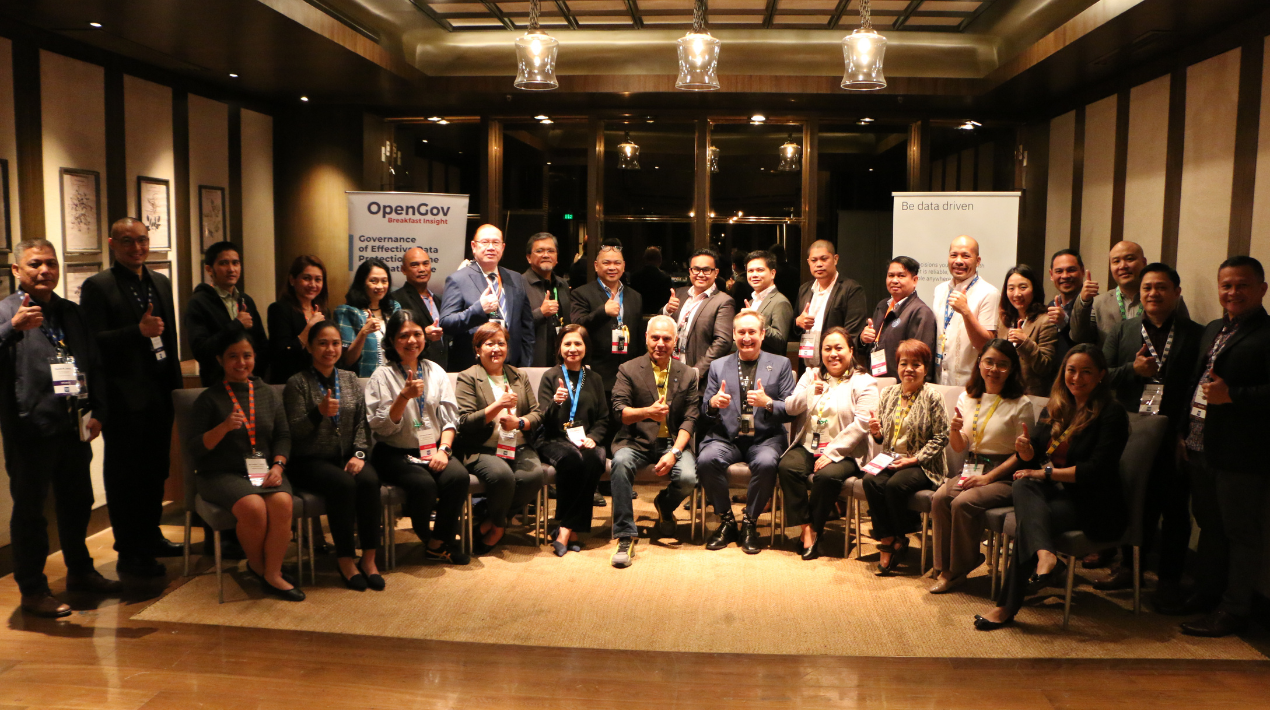
The management and governance of data are crucial components of an organisation’s operations, ensuring the accuracy, reliability, security and accessibility of information when required. However, with the exponential increase in data generation daily, data management and governance have become more challenging.
Eliminating organisational data silos, sharing data securely and ensuring interoperability are primary objectives of data governance. These objectives are achieved by harmonising data across various systems through a collaborative process, including stakeholders from multiple domains.
As organisations increasingly rely on a range of data sources and data analytics, robust safety and protection frameworks are being put in place. They need to optimise their data governance and management processes to ensure they access clean data and use their data assets safely, effectively, and efficiently in line with these standards.
As governments require compliance with such standards, data governance becomes even more of a priority. In this context, a sound data governance strategy ensures data consistency, reliability, and ethical usage.
In the digital era, data has emerged as a vital national strategic resource and is increasingly crucial in nation-building. However, every day, new data security challenges arise, with cyberattacks and data breaches posing significant threats to countries and businesses worldwide. Consequently, both the public and private sectors are working continuously to find effective ways of addressing these mounting security concerns.
To fully leverage their data assets, organisations must prioritise the optimisation of their data governance and management processes. This includes defining data governance policies and standards, establishing data quality metrics, implementing data governance tools, promoting a data-driven culture, and monitoring and measuring data governance performance. These steps ensure that their data is accurate, reliable, secure, and readily available whenever required.
The OpenGov Breakfast Insight on 14 March 2023 held at Shangri-La The Fort Manila delivered the most effective information and data governance policies, regulations, and frameworks to drive the quality, accuracy, and availability of insights for Philippine public sector organisations.
Opening Remarks

“Data is the new oil,” according to Mohit Sagar, CEO & Editor-in-Chief, OpenGov Asia. “It must be extracted, refined and processed like oil before it can be used.”
If handled appropriately, data possesses the ability to provide remarkable and practical insights, facilitating quick and precise decision-making, which in turn can lead to gaining a competitive edge.
“When data is handled and used correctly, it allows governments to be more effective and efficient in their work. Service delivery and citizen satisfaction reflect such effectiveness and efficiency,” Mohit opines.
Data effectiveness ensures that data is fit for purpose and provides valuable insights. On the other hand, data efficiency is concerned with optimising data processing and use to maximise its value while minimising the resources needed to work with it.
In essence, they are two sides of the same coin. Both the effectiveness and efficiency of data are crucial factors for organisations that rely on data to gain business insights for making informed decisions.
However, the growing volume of data automatically collected by systems introduces a new set of risks, responsibilities and challenges. This current surge in data flow and the prevalence of cybercrime highlights the need for a comprehensive governance framework. It is imperative to implement a rigorous approach to ensure that systems and technology have a solid foundation on which to operate.
The Philippines government enacted Republic Act 10173, or the Data Privacy Act, to establish a legal framework for safeguarding citizens’ data. This law serves as a cornerstone for establishing cybersecurity standards.
Building a well-planned and strengthened foundation enables organisations to fully utilize the benefits of integrated and automated systems. Such an environment creates a seamless platform that further enhances effective and efficient citizen service delivery. It promotes alignment, making interconnectivity, integration and collaboration seamless.
A governance framework has a significant impact on data security. Although collaboration among government agencies is desirable, it comes with increased risk, particularly when data is shared. Cybercriminals can exploit the weakest link at each point where two or more organisations connect.
Nevertheless, with the right planning, the deployment of robust cybersecurity systems and the right monitoring measures could be put in place and serve as a shield against such threats. Proper planning can help establish appropriate security policies, protocols, frameworks and tech solutions. This proactive approach can help prevent security breaches, minimise vulnerabilities, and ensure the protection of sensitive data.
Mohit feels, “One of the most common solutions employed is access control. Once access and permission protocols are set in the governance policies, people across agencies work faster.”
Through such safe collaboration among agencies, data can be more effectively managed, leading to greater accuracy, security and ethical and responsible use of data. Citizens are more likely to trust a government that operates this way, promoting better relationships between governments and citizens.
“Protecting citizens’ data increases the public’s confidence in the government. Public trust is a vital component of economic security and national well-being,” Mohit says.
In the end, the establishment of secure and reliable systems builds confidence, resulting in increased uptake of government services and the best possible citizen experience. By prioritising data governance and security, agencies can foster trust, promote collaboration and enhance service delivery, ultimately leading to better outcomes for citizens.
Welcome Address

In her welcome address, Aileen Judan Jiao, President and Country General Manager of IBM Philippines, welcomed participants and highlighted their role in promoting understanding of data governance concepts, including privacy and security.
“We remain dedicated to re-engaging with the government and our goal is to clarify concepts related to data governance, including privacy and security,” Aileen confirms.
IBM has had a presence in the Philippines for 87 years and has made significant contributions to the government sector by providing technological solutions and services that enhance the efficiency and effectiveness of government operations.
The company has provided technical solutions and services to enhance the efficiency and effectiveness of government operations in the Philippines. They have collaborated with various government agencies to deliver technical solutions and services in industries like healthcare, education and transportation.
Their contributions to the government sector in the Philippines are demonstrated through successful projects such as the Tax Administration System, Disaster Response System, National ID System, and Electronic Passport System. These technological solutions have modernised and streamlined government operations, improving citizen services and promoting national development objectives.
“We know that public-private sector partnerships have the potential to improve the delivery of public goods and services,” Aileen is convinced. “We remained committed to and capable of assisting the government in its digital transformation efforts.”
Technology Insight

Kieran Hagan, Data, AI and Automation Principle Technical Sales Manager (ASEANZK), IBM recognizes that while the world has been disrupted by various events, digital transformation remains a significant driving force for change.
This is especially true in how businesses engage with their customers, as the pandemic accelerated the need for digital solutions to meet the evolving needs of customers.
The trend towards digital transformation is expected to continue as technology advances and consumers rely more heavily on digital channels, leading to a greater need for easily accessible and understandable data.
As a result, there is now a greater need for consumable data – data that is easily accessible and understandable – on which people can make informed decisions.
Kieran emphasises the importance of engaging citizens and providing them with personalised, seamless experiences across government services to improve service delivery. This is crucial for any government looking to make it easier for citizens to access and benefit from the services they require and improve their citizens’ trust, satisfaction and overall experience.
Sonoma County is a great example of a government that prioritised strengthening its safety net and transformed how it addressed the needs of its most vulnerable individuals and families.
Kieran highlighted the need to digitally modernise workflows and operations and maintain regulatory compliance while cutting costs and fostering innovation. DataOps is emerging as the ideal approach to managing data to improve organisations’ agility and efficiency.
DataOps, like its precursor DevOps, emphasises collaboration, automation and continuous delivery in software development. It also seeks to break down the silos between teams involved in managing data, such as data engineers, data scientists, and business analysts.
“The advent of DataOps represents a significant shift in the way that organisations manage and leverage data,” Kieran points out. “By adopting a more agile and collaborative approach to data management, organisations can make better use of their data, respond more quickly to changing business needs, and gain a competitive advantage in their respective markets.”
An essential feature of DataOps is its emphasis on data quality. DataOps focuses on ensuring data accuracy, comprehensiveness, and consistency which are crucial for making sound business decisions. Automated testing and validation technologies are used to identify data quality issues before they affect company operations.
Another example provided by Kieran was the Government of Odisha (India), which sought to address the issue of welfare fraud and ensure that the most vulnerable members of the population received the necessary assistance.
The Government of Odisha (India) utilised IBM Analytics tools to crack down on welfare fraud and identified around 500,000 false beneficiaries. By leveraging the available insights on citizens, the government was able to ensure that resources were delivered equitably and tax rupees were employed more efficiently. This effort helped the government to provide the right assistance to those who need it most and eliminate fraudulent activities that siphoned off valuable resources.
In today’s digital age, securing and protecting people, the nation and infrastructure while mitigating data collaboration risks across hybrid cloud environments are of utmost importance. The rise of cloud computing and hybrid cloud environments and the accompanying cyber security challenges now require governments to balance the need to secure their data and infrastructure while ensuring that critical information is available to those who need it.
To mitigate data collaboration risks across hybrid cloud environments, organisations should implement a comprehensive security strategy that includes a combination of technologies, processes and policies. A potent tool is Artificial Intelligence (AI).
“AI is being integrated into daily life, business, government and other fields. IBM assists individuals and organisations in adopting AI safely. Only by incorporating ethical standards into AI applications and processes can we construct trustworthy systems,” Kieran believes.
A holistic approach with robust security measures, transparency, accountability, and secure technology design is highly recommended. The approach becomes more potent when combined with a continuous drive for information and education.
In Conversation With: Enhanced Data Governance that Empowers Stakeholders

Complex information sets are often the norm in today’s government data systems, necessitating the involvement and input of a wide range of stakeholders. The development of meaningful data necessary for efficient and effective decision-making requires extensive cooperation between numerous stakeholders from various government departments and sectors. Hence, the importance of data accessibility and sharing in realising the full cross-sector potential of all data types has grown in recent years.
Hector Melencio, Assistant Vice President and Head of Information Technology, Philippine Amusement and Gaming Corporation (PAGCOR) revealed that they have open communication and every employee is involved in the whole process.
“We have the training and a customer feedback monitoring system in place, and we welcome all suggestions and input from various employees to assist us in making the data protection process better and simpler for everyone,” Hector said.
During the discussion, it was noted that allowing employees to use their personal devices or computers for official work can lead to such situations, making it challenging for organisations to maintain data privacy and security.
Hector’s agency faces challenges in ensuring data privacy because employees use their personal email addresses, making it difficult to track and secure data. While he understands the convenience of using personal email addresses, he acknowledges the need to persuade employees to use company email addresses to prevent security breaches.
Danilo N. Javier, Chief, Information and Data Management, Department of Energy (DoE) shared that his agency promotes inclusive representation and engaged relevant stakeholders in the data ecosystem through its community engagements, data-sharing policy and an open source platform.

Danilo’s department has implemented a data-sharing policy to improve operational efficiency and increase the trustworthiness of its data ecosystem. This policy empowers and proactively engages all relevant stakeholders, including government agencies and private sector partners. The Department of Energy works with various organisations to ensure the energy needs of the Philippines are met securely and sustainably.
“The policy ensures that data is shared transparently and securely, while also respecting individuals’ privacy and encouraging researchers to share their findings with a broader scientific community,” Danilo explains.
Danilo confirmed that the Department of Energy has a strong commitment to securing data sharing, with a focus on ensuring that data is stored and shared securely through robust data infrastructure.
“We are planning to have a zero trust architecture to further enhance their security measures. Right now, we have standard security measures to protect data, encryption, access control and secure data storage.”
The aim is to ensure that their data ecosystem is trustworthy and reliable, and stakeholders can have confidence in the accuracy and confidentiality of the data being shared.
PAGCOR has similar data privacy and data sharing policies to DoE. To improve the system’s trustworthiness, the agency has data safety and privacy, data encryption, access controls, regular security audits and feedback from various stakeholders, Hector confirms. As an added security measure, they conduct numerous audits and risk assessments regularly.
PAGCOR’s main data storage strategy involves the use of hybrid systems. They combine old and new systems to ensure robust security with continuity. They have been involved in improvements over the past two years, and are in the process of procuring the ERP, HRIS, casino management system and different initiatives that would make them competitive and more secure.
Closing Remarks
In closing, Aileen emphasised two areas in data governance. First is the true value of data and second skills. As organisations seek to leverage data to gain insights, make informed decisions, and achieve strategic goals, there is a growing demand for skilled professionals in data management.
“By addressing the data management skills gap, organisations can help individuals advance in their careers and organisations realise the full potential of their data,” says Aileen. “Rectifying the mismatch requires a collaborative effort from individuals, organisations and communities. We are trying to do our part in terms of the skills problems.”
She encourages participants to approach them to avail themselves of their free data governance co-creation workshop for all organisations.
“Transforming the culture of an organisation is a challenging and prolonged undertaking that necessitates consistent endeavours over time,” says Mohit. “You cannot change the culture of your organisation overnight, but you can make one small change.”
Although it is impossible to instantly transform the culture of an organisation, making minor adjustments can result in substantial long-term outcomes. Even small modifications have the power to spark substantial transformations within a company’s culture and serve as positive catalysts for broader change.
“The success of data governance developments hinges on the power of collaboration. Uniting various stakeholders, each with unique insights and proficiencies, is integral to guaranteeing that organisations’ procedures and policies concerning their information management are productive, streamlined, and embraced throughout the company,” Mohit concludes.
















